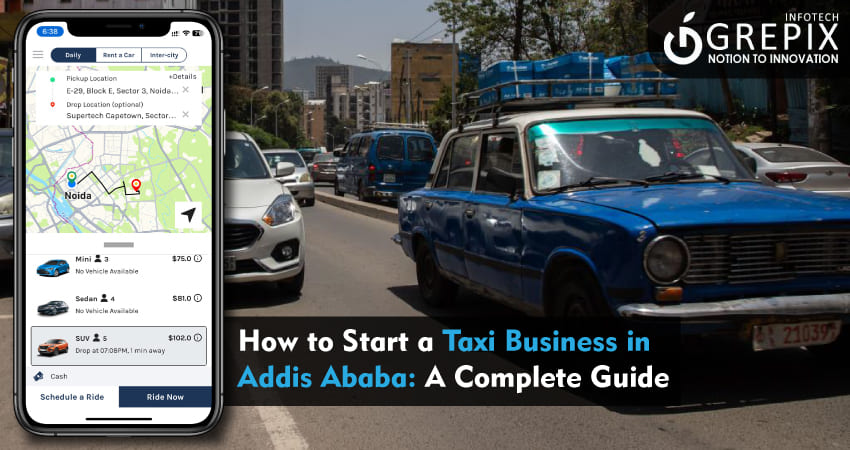How to Start a Taxi Business in Addis Ababa: A Complete Guide
Addis Ababa, the bustling capital of Ethiopia, is home to a growing population and an increasing demand for reliable transportation services. The city's rapid urbanization has created a thriving market for taxi businesses, making it an excellent opportunity for aspiring entrepreneurs. Whether you're looking to operate a fleet of traditional yellow taxis or partner with ride-hailing platforms.
Launching a taxi business in Addis Ababa is a promising venture, but it requires careful planning, dedication, and a commitment to quality service. By understanding the market, meeting legal requirements, and leveraging technology, you can create a thriving business that meets the city's growing transportation needs. Take the first step today and turn your vision into reality!
This guide will walk you through everything you need to know to start your taxi business in Addis Ababa.
Addis Ababa, the bustling capital of Ethiopia, offers immense potential for taxi businesses due to its rapid urbanization, growing population, and increasing demand for reliable transportation services. With traditional taxis and emerging ride-hailing platforms shaping the market, aspiring entrepreneurs have a unique opportunity to establish a thriving business. Success requires understanding the market, meeting legal and regulatory requirements, and adopting technology for efficient operations. This comprehensive guide provides insights into the taxi industry, from planning and licensing to marketing and scaling your business. Start your entrepreneurial journey in Addis Ababa today and capitalize on the city's dynamic transportation needs!
1Understanding the Taxi Industry in Addis Ababa
The Role of Taxis in Addis Ababa’s Transportation Network
In Addis Ababa, taxis are a critical component of the public transportation system. They bridge the gap between private cars and overcrowded minibusses, providing a convenient and flexible option for commuters. With the rise of ride-hailing platforms, the taxi industry is evolving, offering better services and increased accessibility.
Market Demand and Trends
The demand for taxis is driven by urbanization, tourism, and the need for reliable transport options. The popularity of ride-hailing apps like Ride and Feres has also reshaped customer expectations, focusing on convenience and affordability.
Types of Taxi Services You Can Offer
- Metered Taxis: Traditional yellow taxis regulated by the government.
- Ride-Hailing Services: Collaborating with platforms like Ride.
- Shared Taxis: Economical options for commuters traveling similar routes.
2Research and Planning
Identifying Your Target Audience
Understanding your customers is crucial. Are you catering to daily commuters, tourists, or corporate clients? Defining your target audience will help shape your services and marketing strategies.
Analyzing Competition in the Taxi Industry
Study your competitors to identify gaps in their services. Are they missing out on certain routes or customer segments? Use this insight to differentiate your business.
Creating a Taxi Business Plan
A comprehensive business plan serves as your roadmap to success. Start with a mission statement to define your business purpose and objectives. Outline a detailed budget to estimate startup costs for vehicles, permits, and marketing. Include financial projections to forecast revenue and profitability, ensuring a clear strategy for sustainable growth.
3Legal Requirements and Licensing
Obtaining Business Licenses and Permits
To operate legally, you must register your business with the Ethiopian Ministry of Trade and obtain the required permits.
Vehicle Registration and Inspection
All taxis must pass inspection to ensure they meet safety and operational standards. Register your vehicles with the appropriate local authorities.
Adhering to Local Regulations for Taxi Operators
Familiarize yourself with Addis Ababa's taxi regulations, including fare structures, driver requirements, and vehicle standards.
4Choosing the Right Vehicles for Your Taxi Fleet
Types of Vehicles Suitable for Addis Ababa
Selecting vehicles that can handle Addis Ababa's terrain and traffic is essential. Compact cars are cost-effective, while larger vehicles can cater to group transportation.
Cost vs. Quality Considerations
Balance affordability with durability. Invest in reliable vehicles to reduce maintenance costs and improve customer satisfaction.
Vehicle Maintenance and Fuel Efficiency
Regular maintenance and choosing fuel-efficient cars can significantly lower operational costs.
5Setting Up Your Business Operations
Acquiring Office Space and Parking Facilities
Secure a centralized location for your operations, including an office and parking area for your fleet.
Recruiting Drivers
Hire qualified drivers who know the city well and can provide excellent customer service. Training programs can help them meet professional standards.
Establishing Payment Systems
Implement a seamless payment system, offering options like cash, mobile payments, and card transactions for customer convenience.
6Incorporating Technology
Benefits of Using Ride-Hailing Platforms
Ride-hailing platforms like Ride and Feres have transformed the taxi industry in Addis Ababa. Partnering with these apps can help you tap into their established customer base and streamline your operations. These platforms offer convenient features like online booking, digital payments, and driver tracking, making them a popular choice among passengers.
Choosing Taxi Dispatch Software
Investing in taxi dispatch software is essential for efficient fleet management and seamless booking coordination. Choose software that includes real-time vehicle tracking for better oversight, automated scheduling to optimize operations, and customer feedback options to enhance service quality and address passenger needs effectively.
Implementing GPS and Fleet Management Systems
Equipping your vehicles with GPS systems not only ensures accurate navigation but also enhances fleet management. GPS technology helps monitor vehicle locations, optimize routes, and improve fuel efficiency, ultimately reducing costs and improving customer satisfaction.
7Marketing Your Taxi Business
Branding and Creating a Unique Selling Proposition
Branding is more than just a logo, it's about creating an identity for your business. Highlight what makes your services unique, such as punctuality, affordability, or luxury options. A memorable name and slogan can help you stand out in a competitive market.
Leveraging Social Media and Online Platforms
In Addis Ababa, social media platforms like Facebook and Instagram are widely used. Create engaging posts, share customer testimonials, and run targeted ads to reach your audience. A simple, user-friendly website showcasing your services, pricing, and contact information can enhance your online presence.
Partnering with Hotels and Tour Operators
Forming partnerships with local hotels and tour operators is an effective way to secure a steady stream of customers. Many tourists and business travelers rely on taxis for airport transfers and city tours, making these partnerships mutually beneficial.
8Financial Management
Managing Operational Costs
Operational costs, such as fuel, driver salaries, and vehicle maintenance, can quickly add up. Use budgeting tools to track expenses and identify areas where you can cut costs without compromising quality.
Setting Competitive Pricing Strategies
Pricing is a critical factor in attracting and retaining customers. Research the rates charged by competitors and adjust your pricing to offer value while maintaining profitability. Consider discounts or loyalty programs to encourage repeat business.
Tracking Revenue and Expenses
Keep detailed records of all financial transactions. Use accounting software to monitor cash flow, generate invoices, and prepare for tax filings. Regular financial reviews will help you identify trends and make informed decisions for growth.
9Ensuring Safety and Customer Satisfaction
Importance of Passenger Safety
Passenger safety should be a top priority. Conduct thorough background checks on drivers and ensure all vehicles meet safety standards. Installing in-vehicle cameras can provide an added layer of security.
Implementing Feedback Mechanisms
Customer feedback is invaluable for improving your services. Create easy-to-use channels for passengers to share their experiences, such as online reviews or in-app ratings. Address complaints promptly to maintain a positive reputation.
Training Drivers in Customer Service
Well-trained drivers are the backbone of a successful taxi business. Equip them with skills in professional communication to ensure positive customer interactions, efficient route navigation to minimize travel time, and strategies for handling challenging situations calmly and effectively. This commitment to training enhances service quality and builds customer trust.
Also Read: "Accelerating Your Fortune: Becoming a Billionaire in South Africa's Taxi Industry"
10Navigating Challenges in the Taxi Business
Rising Fuel Costs
Fuel prices can have a significant effect on your finances. Consider utilizing fuel-efficient vehicles or exploring alternative energy options like electric or hybrid cars to help reduce expenses.
Managing Competition from Ride-Hailing Apps
Ride-hailing apps dominate the market, but you can still compete by offering superior service. Focus on reliability, punctuality, and personalized experiences to differentiate your business.
Dealing with Regulatory Changes
Stay informed about local regulations affecting the taxi industry. Regularly review compliance requirements to avoid fines or disruptions to your operations.
11Scaling Your Taxi Business
Expanding Your Fleet
As your business grows, reinvest profits to add more vehicles to your fleet. Expanding your capacity will allow you to serve more customers and increase revenue.
Introducing New Services
Diversify your offerings to cater to different customer needs. Consider:
- Luxury Taxis: For corporate clients or special occasions
- Airport Transfers: Reliable transport to and from the airport
- Tour Packages: City tours for tourists exploring Addis Ababa
Partnering with Corporate Clients
Establish long-term contracts with businesses for employee transportation. Corporate partnerships provide a consistent revenue stream and help build your reputation.
12Tips for Long-Term Success in the Taxi Industry
Staying Updated on Industry Trends
The transportation industry is evolving rapidly. Keep up with new trends, such as electric vehicles, app-based bookings, and sustainable practices, to remain relevant.
Focusing on Sustainability
As the world shifts toward eco-friendly solutions, consider investing in electric vehicles or adopting sustainable business practices to appeal to environmentally conscious customers.
Building Strong Relationships with Customers
Loyal customers are your biggest asset. Offer promotions, listen to feedback, and create a seamless experience to keep them coming back.
Conclusion
Grepix Infotech, a leading taxi app development company, is here to empower your entrepreneurial journey in Addis Ababa. As the bustling capital of Ethiopia continues to grow, the demand for reliable transportation services presents an unparalleled opportunity for aspiring taxi business owners. From the city's evolving ride-hailing landscape to its diverse customer base, there has never been a better time to launch your taxi venture.
With the guidance provided in this comprehensive guide and Grepix's advanced taxi app solutions, you have all the necessary tools to succeed. Our robust, customizable platforms ensure seamless operations, efficient fleet management, and a user-friendly experience for drivers and passengers.
By leveraging technology, adhering to local regulations, and focusing on customer satisfaction, you can build a thriving taxi business that meets Addis Ababa's dynamic transportation needs. Let Grepix Infotech be your partner in success start your journey today, and together, we’ll drive your business toward a prosperous future!
FAQs
1. What is the average startup cost for a taxi business in Addis Ababa?
The expenses vary but usually include marketing, permits, and car purchases. To begin, budget between 500,000 and 1,000,000 ETB.
2. How do I compete with ride-hailing apps like Ride or Feres?
Focus on customer service, reliability, and offering niche services that ride-hailing apps may not cover, such as luxury taxis or specialized routes.
3. Are there incentives for using electric vehicles in Ethiopia?
Yes, the government is starting to encourage green initiatives, and using electric vehicles may reduce long-term costs and attract eco-conscious customers.
4. What are the challenges of operating a taxi business in Addis Ababa?
Common challenges include rising fuel costs, competition, and navigating complex regulations. Staying adaptable and informed is key.
5. How can I ensure my taxi drivers provide excellent customer service?
Train your drivers thoroughly in communication, route navigation, and handling customer complaints professionally.
Looking out to start your own venture like Uber? Try out our HireMe Taxi Uber Clone, the easiest way to kick-start your taxi business.







